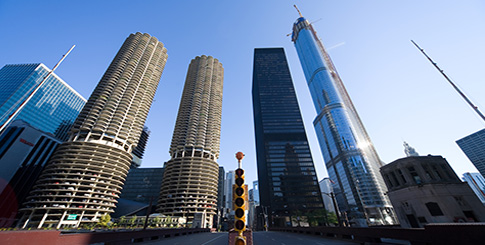“We can drop-ship most things and can access warehouses in Nogales, AZ and McAllen, TX,” he continues. “These are just some of the services we provide as a distributor.”
Shifting Retail Landscape
The departure of Dominick’s and bankruptcy of Central Grocers along with the growth of online ordering continues to reshape Chicago’s bricks-and-mortar retail scene.
Change is the only constant
Last August, the Chicago Tribune reported there were 262 grocery stores in the Windy City and its surrounding suburbs, the lowest number since 2009.
With closures, consolidation, and more consumers trying online shopping, retailers have had to step up their game to stay in business. Remedies have included renovations and adding cafés (becoming a ‘grocerant’ or combined grocery store and restaurant) with wireless capabilities, getting into delivery or curbside pickup, reducing square footage, or adding or removing certain types of products.
But like a cleared patch of old growth forest that allows new young trees to flourish, some in the business see the consolidation and disappearance of big players like Dominick’s as an opportunity for smaller retailers or newer entities to get into the marketplace. “Stores have not so much dwindled,” opines Vega, “but increased in numbers and strength.”
Kroger made news by announcing its intention to stock hardware items from Ace on its shelves, while other retailers want to reduce SKUs or streamline the shopping process with scan-and-go technology—putting a new spin on self-checkout. Illinois favorite Jewel-Osco is retooling stores and has added delivery to attract new shoppers and retain loyalists.
Amazon, Whole Foods, and 365
The elephant in the room is Amazon’s purchase of Whole Foods Market, which may affect grocery shopping in many different ways. Though Amazon has said online sales of Whole Foods private label products have soared, it’s unclear how the acquisition will impact the retail scene in other ways such as curbside pickup or the in-store experience.
Further muddying the waters is Whole Foods’ fledgling 365 or less-is-more concept, which has had success in other states and is due to open in Evergreen Park, a southern section of Chicago’s metro area.
These stores are smaller than traditional Whole Foods locations, have fewer employees, lower prices, and a lack of bells and whistles—like German retailer Aldi (which has 20 stores in Chicago neighborhoods and more in the outlying suburbs). And although Amazon is not abandoning the 365 concept, it appears to be a lower priority at this time.



